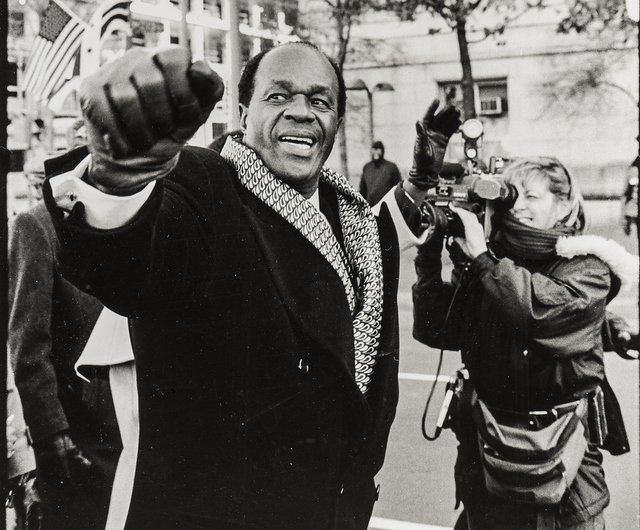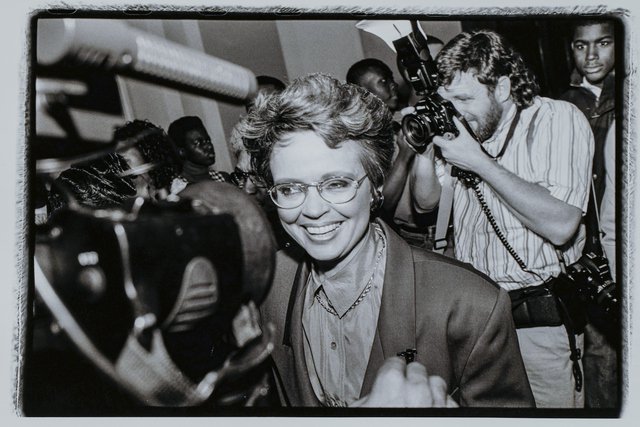[ad_1]
By Lenore T. Adkins, Special to the AFRO
The political downfall and resurrection of the late Marion Barry, beloved by many as “Mayor for Life,” and derided by some as a crooked politician, figures prominently in a new special documenting the District’s 90s-era highs and lows.
Washington in the ‘90s premieres 8 p.m. July 10 on WETA TV Channel 26 and HD. The hour-long program chronicles Washington, D.C.’s transition from a city of headline-grabbing violence and corruption to a land of opportunity. The AFRO received an advanced copy of the special for reporting purposes.

Black Washington is on full display in the program. It dives into the go-go music scene. In the ’90s, Go-Go was more popular in D.C. than Hip Hop. But many Go-Go clubs, including the Ibex, were shut down because of the shootings and other violence that many blamed on the music.
The special also details former D.C. Mayor Sharon Pratt’s stumbles in office – she made the unpopular decision to scuttle Barry’s popular summer jobs program and was widely blamed for losing the Washington Redskins.
The documentary showcases the Million Man March, the construction of the Green Line and the subsequent revitalization of U Street that included the reopening of the historic Lincoln Theater.
Washington in the 90s deploys archival footage, music, and original interviews with Washingtonians to bring the 1990s to life. WETA Producer Seth Tillman, 37, who grew up in and around the District in the 1990s, created a program that amplifies what he thinks newcomers and Washingtonians should know about the city and why what happened back then is relevant today. “It seems almost like a simpler time right now, but there was a stronger D.C. identity and people feel that sometimes slipping away,” Tillman told the AFRO.

Among those interviewed are Cora Masters Barry, former first lady of Washington, D.C.; former D.C. mayors Anthony Williams and Pratt; Kamal Ali, co-owner of Ben’s Chili Bowl; author and activist Tony Lewis Jr.; retired Washington Redskins player Darrell Green; filmmaker Sam Bardley; and NBC4 anchor Pat Lawson Muse. Long-time NBC4 anchor and reporter Doreen Gentzler narrates the program.
Gentzler joined NBC4 in 1989 and had been on the job six months when federal and local authorities arrested Marion Barry in an undercover operation in a D.C. hotel room. Gentzler remembers her co-anchor Jim Vance was out at a dinner, so the responsibility of breaking the news – and interrupting the popular show LA Law – fell on her shoulders.
“I just remember thinking, ‘I am not the right person to do this six months on the job. Let’s find Vance. He needs to do this or we need to do this together,’” Gentzler told the AFRO. “I don’t want to be right out there by myself with this one.”
It was a tumultuous time in the District and Barry became a national punchline. The documentary shows grainy footage of the former mayor smoking crack with a woman who wasn’t his wife and David Letterman lampooning the former mayor on the comedian’s namesake late-night talk show.
In a story of D.C. legend, the polarizing Barry launched his political comeback after serving six months in prison on a misdemeanor drug charge, winning the Ward 8 seat on the D.C. City Council in 1992. He was reelected mayor for his fourth and final term in 1994, defeating Pratt.
In 1995, Congress launched the District of Columbia Financial Control Board to monitor city spending, in light of financial woes dogging the city. Two years later, Congress stripped Barry of the majority of his mayoral power, doling out nine crucial city departments to the control board. “It was painful to watch – that overseer federal government looming over us as if we were irresponsible people,” Pratt recalled in the documentary.
The show credits Barry for bringing the MCI Center (then the home of the Washington Capitals) to the District, a move that helped spur downtown development and attracted restaurants and nightspots.
Barry died in 2014 at the age of 78.
Former Mayor Williams, then the city’s chief financial officer, took over after Barry decided not to run for reelection in 1998 and saved the city from financial ruin. Williams, a policy wonk, ushered in the city’s gentrification, spurring people to leave the suburbs and move into the city – a trend continuing today under Mayor Muriel Bowser.
“The bad part of it is displacement where people who were part of the city had a stake in the city when the city was struggling,” Williams says in the documentary. “Now that the city’s doing well, they’re no longer a part of that picture.”
The documentary’s light-hearted moments include the manufactured doomsday hysteria surrounding the imagined Y2K frenzy, the Washington Redskins winning the Super Bowl, and the blizzard of 1996. The Clinton years and the District’s emergence as a tech hub are included as well.
[ad_2]
Source link

